Nelson Mandela University.
As part of Nelson Mandela University’s growth in the marine and maritime space, in January 2018 its Faculty of Engineering, the Built Environment and Information Technology (EBEIT) launched its bachelor’s degree in Engineering Technology in Marine Engineering .
“We are able to register up to 75 first-year students each year,” said Howard Theunissen, EBEIT’s Marine Engineering and Nautical Science Project Manager, who presented at the IIOE-2 conference. “The degree is accredited by the South African Maritime Safety Authority and the Engineering Council of South Africa, which is a signatory to the body of engineering councils around the world.”
 Marine Engineering PhD Boswell Douse (left) and John Fernandes lecturer in Marine Engineering at the University of Southampton
Marine Engineering PhD Boswell Douse (left) and John Fernandes lecturer in Marine Engineering at the University of Southampton
EBEIT plans to offer a Naval Architecture honours degree from 2022 and a master’s thereafter, and is engaging with the Royal Institute of Naval Architects in this regard.
Naval Architecture PhD
Naval Architecture PhD candidate, Boswell Douse is doing his PhD at the University of Southampton, supported by the Faculty of EBEIT and Department of Higher Education and Training’s New Generation of Academics Programme (nGAP). He explains that all fishing vessel hulls are designed for northern hemisphere ocean conditions, and our southern oceans are very different, which calls for a different design of hull.
“We have bigger, more powerful swells and the vessels roll a lot more in the southern hemisphere oceans, which is not comfortable for the seafarers on the boats,” Douse explained. “Another factor that needs to be built into the design is the high temperature variability in the southern hemisphere oceans — from the cold temperatures when they go down south to the hot, tropical conditions up the east coast of Africa.”
Key training partnerships: merSETA and Wärtsilä
The faculty has received considerable support locally and internationally for its marine and maritime programmes. “Credit is due to Dr Raymond Patel, the chief executive of the manufacturing, engineering and related services SETA (merSETA). His foresight as to what the growth of EBEIT’s offerings can contribute to the blue economy, led to the SETA awarding the faculty an annual R10-million grant over the past three years,” said Theunissen.
One of EBEIT’s key industry partners is the Finnish marine manufacturing and engineering corporation, Wärtsilä. The company routinely trains engineers and technicians from all over the world, and is contracted to supply the engines and power train for the South African Navy’s new hydrographic vessel — a scientific research and investigation vessel being built by the Southern African Shipyards in Durban.